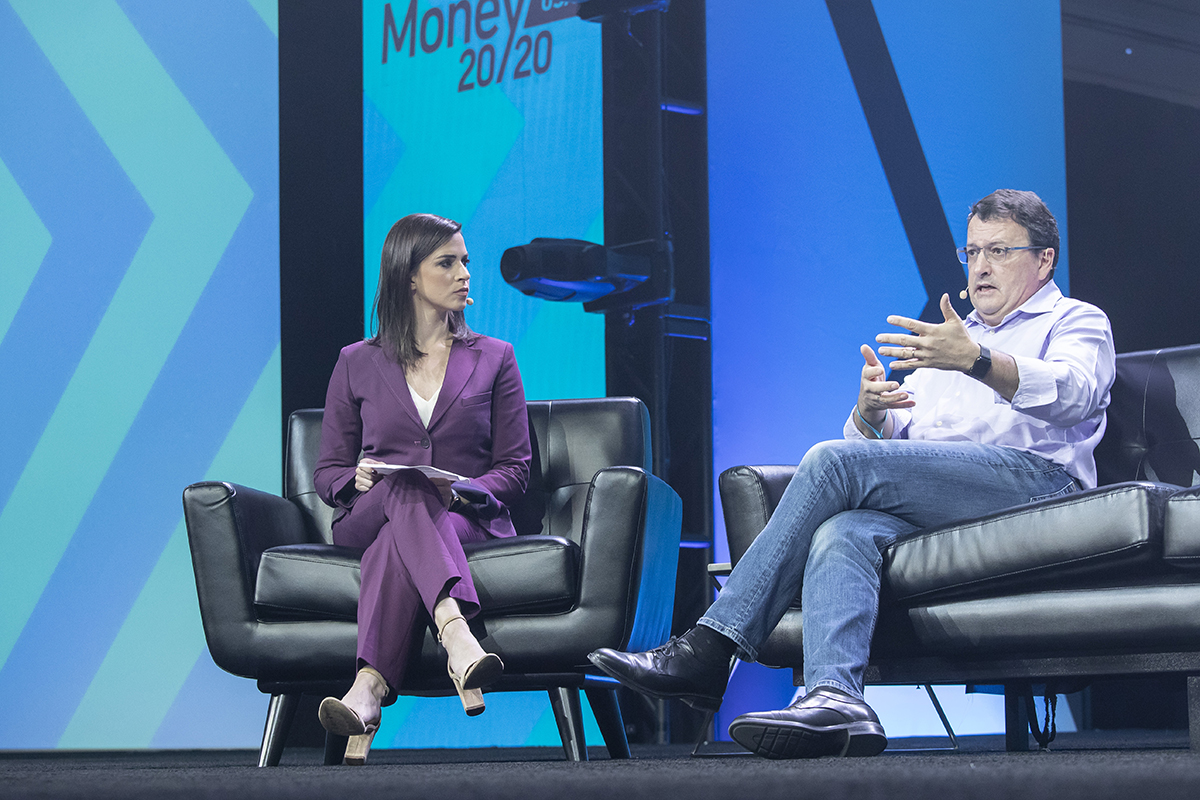Article
Amazon exec: Voice assistant makes retail experience personal, natural, authentic
Voice commerce continues to grow, offering retailers new ways to engage the consumer. But Patrick Gauthier, vice president of Amazon Pay, has more questions than answers about how voice commerce will ultimately change retail.

December 19, 2018 by Elliot Maras — Editor, Kiosk Marketplace & Vending Times
Editor's Note: an earlier version of this article ran on Retail Customer Experience, a Kiosk Marketplace sister publication.
 |
CNBC's Leslie Picker interviews Amazon Pay's Patrick Gauthier. Photo courtesy of Money20/20. |
Pizza Hut made headlines two years ago when it began taking voice orders via Amazon's Alexa. Since then, more retailers have followed suit. Last summer, Stop and Shop's online Peapod grocery service introduced an "Ask Peapod" feature using Alexa that allows for hands-free ordering. This past summer, Amazon announced an Alexa for hotels and motels to help guests order things and make dining reservations.
The big question on many retailers' minds is when will the "tipping point" arrive — that point in time when a new technology becomes mainstream. Some might think voice commerce has already arrived.
Attendees at the recent Money20/20 in Las Vegas learned how Amazon is tracking its progress with Alexa when Patrick Gauthier, vice president of Amazon Pay, addressed the topic, "Hey Alexa, what's next for voice commerce?"
'Once in a decade' transformation
Gauthier, interviewed by CNBC reporter Leslie Picker, was hesitant to offer a lot of predictions about Alexa, but he didn't hesitate to call voice and smart assistants a "once in a decade type of transformation," similar to smartphones and web e-commerce.
"We will gradually see adoption by consumers," he said. "It's very clear that consumers are embracing smart assistants."
A show of hands from the audience revealed most attendees own a voice assistant while 36 percent have actually used it for retail purchases.
As for how fast adoption will occur, Gauthier said it may depend on the growth rate of connected devices and cloud servers.
"You don't drive adoption of customers; you follow the needs of the customers and you fulfill them," he said in a post presentation interview.
When new technology comes to market, both the consumer and the merchant engage in a discovery process to identify the use case that makes the most sense, he said.
Using himself as an example, Gauthier said he uses Alexa to create a shopping list, which Alexa then updates as he makes his purchases in the store.
'The power of the moment'
Virgin Trains, a transportation provider in the United Kingdom, was able to cut the time needed for getting train tickets from seven to two minutes by taking orders from customers using Alexa. Gauthier called this an example of "the power of the moment."
"We give back the gift of time to consumers," he said. By doing this, Gauthier said retailers may find an opportunity to further engage with consumers and create a more rewarding customer experience.
"When you understand context, you can really create an excellent experience," he said.
"Voice commerce and smart assistant are going to enable interaction with consumers in the moment," Gauthier said. "It could be before the purchase, during or after." He offered examples to illustrate how each of these three scenarios could play out. Before the purchase: "Help me remove that stain from my shirt." During the purchase: "Order this special stain remover that I need." After the purchase: "Alexa, when is the stain remover arriving?"
"It is really important for both the consumer and the merchant to sort of free themselves from thinking about a transaction on a device," Gauthier said. "It's important to think not just outside of the box (but) to think outside of the mobile," he said.
"We are with voice capable of stringing together all of these moments that will overall create a better consumer experience," he said.
One question that naturally arises is: What can merchants do to drive consumer adoption of voice commerce? Another question: Which consumers are using it now? Still another question: To what extent does voice technology impact the likelihood of making a purchase?
Such questions are not unlike the uncertainties about e-commerce in its early days, Gauthier said.
Gauthier echoed the views of numerous retail observers in saying the physical store will not be replaced, but it is evolving. Amazon obviously recognized this when it acquired Whole Foods Market. Gauthier said he could not say how the grocery chain will use Alexa.
One question on the minds of many listeners was how brands should prepare for voice commerce. There is an opportunity to create authentic conversations with customers, Gauthier said.
"With a smart assistant, we can again make the experience of commerce more personal, more natural, more authentic," he said, adding that commerce, at one time, was a personal experience for consumers. "Modern life has sort of taken that away from us."
Brands should seize the opportunity to learn how to use smart assistants to create an intimate conversation with the consumer, he said. "When they (brands) do that, they will thrive," he said. "When we solve customer problems, adoption will follow. It's happened before; it will happen again."
About Elliot Maras
Elliot Maras is the editor of Kiosk Marketplace and Vending Times. He brings three decades covering unattended retail and commercial foodservice.
 ChatGPT
ChatGPT Grok
Grok Perplexity
Perplexity Claude
Claude










